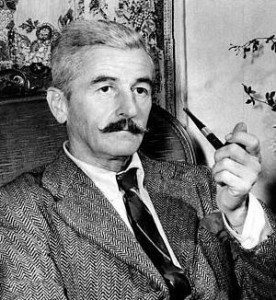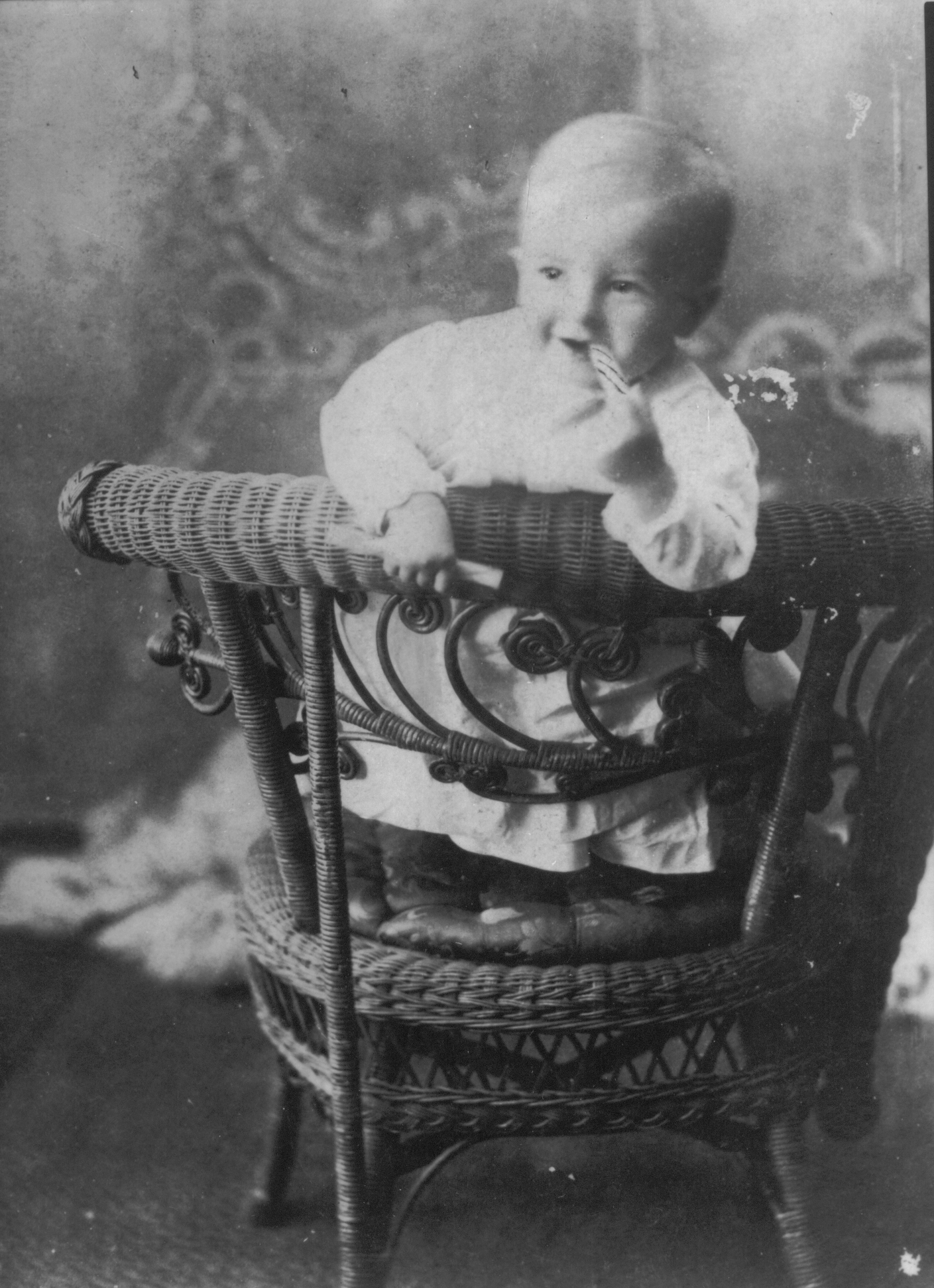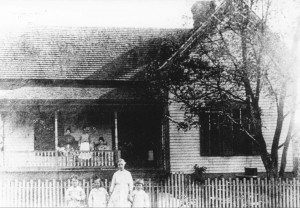William Faulkner
From New Albany to Yoknapatawpha

William Faulkner
Arthur F. Kinnney, scholar – “In the past few years, critical work on Faulkner has exceeded that of any other author in English save Shakespeare”. This self proclaimed “country man” or “farmer” just happened to be born in New Albany, Mississippi . . Birthplace of William Faulkner
The coming of the railroads was an important event in the history of Union County. The first east-west line crossed the tracks December 2, 1886, followed by the Gulf & Ship Island, a narrow gauge railroad built by Col. W. C Falkner and his partner Richard J. Thurmond of Ripley Mississippi. It was this desire of Col. Falkner’s to build a railroad to link Ripley with Chicago and the Gulf of Mexico that resulted in William Faulkner, considered by many critics to be America’s greatest writer of the 20th century, being born in New Albany, Mississippi. The track though New Albany was completed in August 1887.
William Cuthbert Falkner (he later added the “u”to the spelling of his name) was born in New Albany on September 25, 1897. When he was born, his parents, Murry and Maud Falkner lived in a simple frame house on the corner of Jefferson and Cleveland Streets, a few blocks from the railroad. It has been said the house was one of the first built on the North side of town.
At that time Murry Falkner was working as a clerk at the depot of the Gulf and Ship Island Railroad. By this time his father, John W. T. Falkner owned a majority interest in the company. Of the Fallkner’s time in New Albany, Joseph Blotner, in Faulkner – A Biography, states that William was a colicky baby. He further writes “In the heat of the insect-loud September and October darkness he would keep his mother awake almost every night. She would rock him steadily, the tiny woman in her kitchen chair. According to family lore, it was a straight chair, and with each forward notion the front legs would strike the floor with a sharp report that echoed through the open windows. She and her husband had lived in New Albany for almost a year now, but they did not know many people. They were stand-offish, thought some of the neighbors.”

Faulkner as a child in New Albany, Mississippi
Visitors to New Albany interested in Faulkner often inquire about the family’s move to Oxford. In an article for the New Albany Gazette, February 27, 1976, W. O. Rutledge, Jr, owner and editor, refers to the circumstances leading up to the decision of the Murry Falkners to move to Oxford with considerably different details than that given by Faulkner researcher, Robert Coghlin, in his book, The Private World of William Falkner in which he muses on the importance to literary circles and history that the change of residence of the family did take place, otherwise, presumably “the Jefferson of the stories would resemble New Albany and would be populated by a different cast of characters – forms still another saga of the Sartoris-Falkner derring-do.”
As to the events leading up to the family’s decision to move from New Albany -primarily the decision of “Miss Maud”, mother of the author – the Rutledge relates his authenticated story with minor variations within the realm of possibility follows: “Living across the street from the Murry Falkners was a prominent druggist of New Albany, Will A. Bratton. Living with the Murry Falkner family at the time was his unmarried sister, who was generally called “Auntee” and who was quite popular with the young men her age. Mr. Falkner was said to have heard that Mr. Bratton had made a slurring remark about his sister’s character and vowed to have his young sister’s honor defended.
One late afternoon after supper on a long summer day soon after he had heard of the remark, Murry told his wife, Maud, he was going downtown, only a couple of blocks away, and “Have it out with Will Bratton.” Somehow, Bratton got wind of his neighbor’s threat and prepared himself for the upcoming visit from Falkner. When Falkner entered Bratton’s drugstore, the druggist reached under the counter, picked up his pistol and fired point blank at Falkner, wounding him slightly in the hand, but sufficiently to remove any thoughts of further gunplay. As soon as Murry was able to travel, “Miss Maud” announced to him and the family that they were moving to Oxford before Murry had another chance to get himself killed and so they did.”

Birthplace of William Faulkner located at the corner of Cleveland and Jefferson Street in New Albany
Blotner further related the actual move. “Murry Falkner had every reason to be satisfied with the Gulf & Chicago (formerly Gulf & Ship Island ). At New Albany, a town of 548 inhabitants, he had served as general passenger agent. In November 1898 he was appointed auditor and treasurer and placed in charge of the Traffic and Freight Claim Departments. That December, or shortly thereafter, Murry moved his family to Ripley, where he would be discharging his new responsibilities. On September 22, 1902, the Falkners left Ripley. Symbolically, the three little boys (brothers John and Jack had been born by then) left with their mother, riding the line their father had served to New Albany, where Willie had first seen the light of day. From there they rode (another line) to Holly Springs, and then completed their two-day journey on the cars of the Illinois Central into Oxford” – and William Faulkner’s Yoknapatawpha.
William Faulkner’s fictional Yoknapatawpha County primarily focuses on life in Lafayette County, Mississippi, and his hometown of Oxford, the source of much of Faulkner’s fiction. The stories he heard, the experiences he encountered, and the people with whom he associated in and around this area were also an important source. In north Mississippi, his native soil reached into Union, Tippah and Marshall counties. Could it not be that New Albany, the town where he was born, “located 40 miles from the University” actually be his “Jefferson” just filled with the town folk of Oxford and all the other surrounding communities?
A published report by the Mississippi Library Commission states that William Faulkner’s stature as a major writer, perhaps the best that America has produced, is assured. He was always a private man, a local man, rooted in Mississippi for all that he was worth, but out of his “postage stamp of native soil” he shaped a universe so rich with life that it can never be exhausted. All that remains is to read him.


